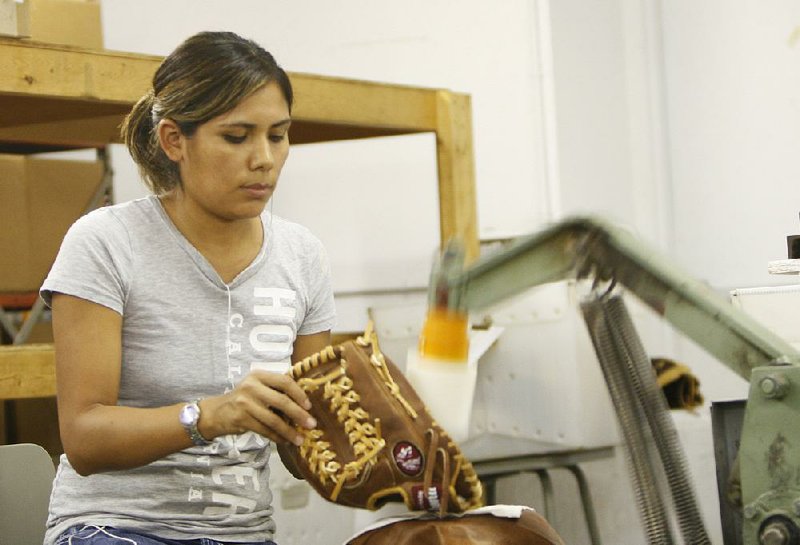NOCONA, Texas -- This little brick factory isn't supposed to be here. It should be in the Philippines, or Vietnam, maybe China. Not here, in the heart of Texas.
Not many baseball gloves are made in America anymore. In the 1960s, production shifted to Asia and never came back.
One company didn't get the memo. Since the Great Depression, Nokona has been making gloves in a small town outside Dallas with a long history of producing boots and whips for cowboys. There's a livestock-feed store next door to the factory, which offers $5 tours for visitors who want to see how the "last American ball glove" is made. You can watch employees weave the webbing by hand, feed the laces through the holes with needles, and pound the pocket into shape with a rounded hammer. The American flag gets stitched into the hide -- and that, they say at Nokona, is more than just a business matter.
"Made in America means you believe in our country," said Carla Yeargin, a glove inspector and tour guide at Nokona, where she worked her way up from janitor. "We have the love for the ball glove, because we made it here."
And the final product could cost 25 times more than a foreign-made version at a discount store. That's partly a reflection of the premium nature of the Nokona line but still it represents a huge challenge for the company.
Manufacturing a product of 100 percent American-made parts is also a challenge.
"Supply chains have been so heavily outsourced that it's no longer possible to buy American for some products," said Mark Muro, a senior fellow at the Brookings Institution in Washington who studies advances in manufacturing. "The suppliers don't exist. In some instances, it's too little, too late."
Nokona refused to follow the herd.
After the Civil War, ranchers drove longhorn cattle through Montague County to livestock markets in the north. The town of Nocona, located some 100 miles northwest of Dallas and named after a Comanche chief (hence the American Indian-in-headdress logo on Nokona gloves), developed a reputation as a leather-goods hub.
The company's name is spelled with a "k" because it was told in the 1930s that the town's name couldn't be trademarked. Today, Nocona is home to about 3,000 people and a few stoplights. "God Bless America" banners line the street, and locals wish you a "blessed day."
Founded in 1926, the company originally made wallets and purses. It was a former Rice University baseball player named Roberts Storey who steered Nokona into ball gloves.
In the early days of baseball, it was considered unmanly to use a glove. Broken bones were common. The first mass-produced gloves had little padding and no fingers. In the 1920s and '30s, companies started producing gloves with a web between the thumb and forefinger, to create a pocket.
The shift to Asia in the 1960s nearly put Nokona out of business. Storey wouldn't budge. "It hit him all wrong that we would have to go to Japan," said his grandson Rob Storey, now the company's executive vice president. "One of his favorite sayings was: 'If I have to tell my employees we're closing up and they don't have jobs any more, I may as well get a bucket of worms and go fishing.'"
It hasn't been an easy faith to keep. The company went bankrupt in 2010 but kept producing after a Phoenix-based maker of football gloves bought a majority stake. And cracks are starting to show in Nokona's claim to be all-American. It recently started importing partially assembled gloves from China, made of Kip leather, a luxury cowhide.
Still, 98 percent of its gloves are made at the factory in Nocona. The nutty scent of leather fills the place. In the lobby, samples of the company's work over the decades are displayed on the wall, from wallets to football pads. Helen the cashier -- who's worked there for 55 years -- will write out a receipt by hand for purchases at the factory.
Making a glove involves about 40 steps and can take four hours. Hides, mostly from Chicago or Milwaukee, are tested for temper and thickness. Workers lower presses onto metal dies to cut the leather. The pieces -- some models require 25 of them -- are sewn together, joining the inner and outer halves. The product is turned right-side-out and shaped on hot steel fingers. A grease used during World War II to clean rifles is lathered under the pocket, to keep it flexible.
The company emphasizes the craft that goes into each glove, and that's reflected in the bill. Rawlings has gloves for all budgets: Its top-end models cost plenty, but you can get a 9-inch children's version for less than $8. Nokona's equivalent-sized mitt costs $220, and its pro model runs to $500.
Nokona ships about 40,000 gloves a year, a fraction of the 6.2 million sold annually in the U.S. It employs about 35 people at the Texas plant. Storey won't disclose the privately held company's revenue. "Will we ever be Nike? No." But he says it's profitable. Trump got 88 percent of votes in the county and Storey counts himself a supporter. He welcomes White House support for domestic manufacturers: "It's music to our ears."
Business on 08/15/2017
